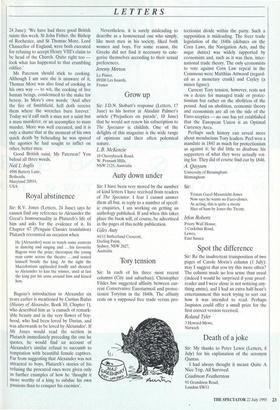Tory tension
Sir: In each of his three most recent columns (City and suburban), Christopher Fildes has suggested affinity between cur- rent Conservative Euroturmoil and protec- tionist Toryism in the 1840s. The affinity rests on a supposed free trade versus pro- tectionist divide within the party. Such a supposition is misleading. The freer trade legislation of the 1840s (debates on the Corn Laws, the Navigation Acts, and the sugar duties) was widely supported by economists and, such as it was then, inter- national trade theory. The only economists to vote against Corn Law repeal in the Commons were Matthias Attwood (regard- ed as a monetary crank) and Cayley (a minor figure).
Current Tory tension, however, rests not on a desire for managed trade or protec- tionism but rather on the abolition of the pound. And on abolition, economic theory and economists are all on the side of the Euro-sceptics — no one has yet established that the European Union is an Optimal Currency Area.
Perhaps such history can reveal more about mendacious Tory leaders. Peel won a mandate in 1841 as much for protectionism as against it; he did little to disabuse his supporters of what they were actually vot- ing for. They did of course find out by 1846.
A. Qayyum
University of Birmingham Birmingham


















































 Previous page
Previous page